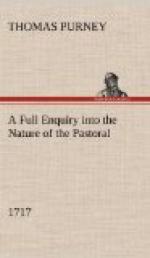And again.
A simple Shepherd Born in Arcady,
Of gentlest Blood that ever Shepherd
bore, &c.
Such beautiful Turns of Words as these are extremely scarce in Spencer; but he has not one but what is inimitably fine and natural.
Let us now see the two Phrazes which Creech has happen’d upon. Whose Language I have observ’d to be infinitely the best of any of our Pastoral writers, next to Spencer. This is one of them. A Shepherdess says to a persuading Swain.
You will deceive, you Men are all Deceit;
And we so willing to believe the Cheat.
The other is this, to Diana; when she consents.
I liv’d your Vot’ry, but no more can live.
CHAP. III.
The Tender in Pastory distinguish’d from that in Epick poetry or Tragedy.
’Tis strange to me that our Pastoral Writers should make no Distinction between their SOFT when they write Pastories, and when they write Epick Poetry. This in Philips is the Epick Softness, or what we call the Beautiful sometimes in Epick Poetry in Opposition to the Sublime.
Breath soft ye Winds, ye Waters gently
flow;
Shield her ye Trees, ye Flow’rs
around her grow, &c.
And this which also is the Sixth Pastory.
Once Delia lay, on easy Moss
reclin’d,
Her lovely Limbs half bare, and rude the
Wind, &c.
This also is of the same kind of SOFT.
A Girland deckt in all the Pride of
May,
Sweet as her Breath, and as her Beauty
Gay, &c.
But Instances were endless. In Opposition to this kind of Soft, I shall quote out of Spencer some Passages which have the truest Softness. For such that Author has, beyond any in the World, tho’ perhaps not very often. He begins his last Pastory thus.
A gentle Shepherd sate besides a Spring,
All in the shadow of a bushy Breer,
&c.
And his first he begins thus.
A Shepherd’s Boy (no better do him call) &c.
His Pastoral named Colin Clout’s come home, begins thus.
The Shepherd-boy (best known by that Name) Who after TITYRUS first sang his Lay, Lays of sweet Love, without Rebuke or Blow, Sate, as his manner was, upon a Day, &c.
These Lines of Spencer and those of Philips, both contain agreeable Images and Thoughts, yet are they as different as Milton and D’Urfey.
I shall only make one Observation on this difference. Namely, that in the soft and beautiful Lines of Philips, each Word, only signifies a soft and beautiful Idea; As Breath, Waters, Flow, Gently, Soft, &c. but in Spencer the sound also is soft. Had such an Author dress’d this inimitable Thought of Philips, the Line would have glided as smooth and easy off the Tongue, as the Waters he mentions, do along the Meadows.




